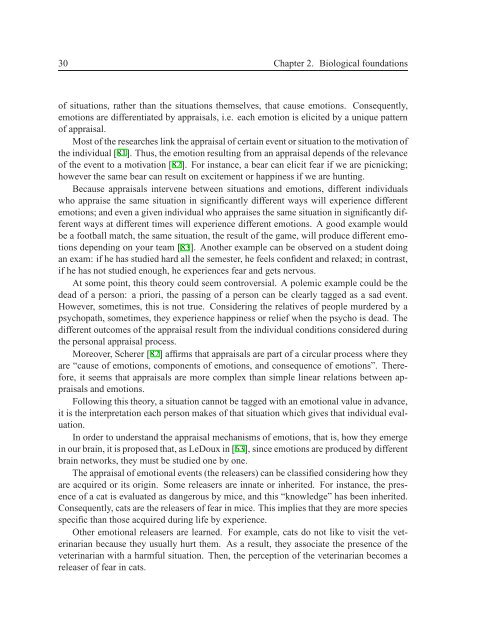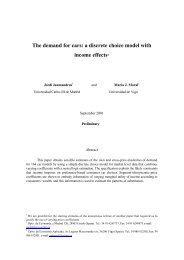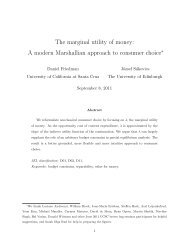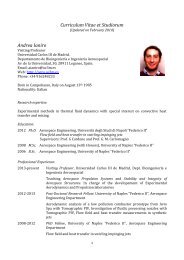TESIS DOCTORAL - Robotics Lab - Universidad Carlos III de Madrid
TESIS DOCTORAL - Robotics Lab - Universidad Carlos III de Madrid
TESIS DOCTORAL - Robotics Lab - Universidad Carlos III de Madrid
You also want an ePaper? Increase the reach of your titles
YUMPU automatically turns print PDFs into web optimized ePapers that Google loves.
30 Chapter 2. Biological foundationsof situations, rather than the situations themselves, that cause emotions. Consequently,emotions are differentiated by appraisals, i.e. each emotion is elicited by a unique patternof appraisal.Most of the researches link the appraisal of certain event or situation to the motivation ofthe individual [81]. Thus, the emotion resulting from an appraisal <strong>de</strong>pends of the relevanceof the event to a motivation [82]. For instance, a bear can elicit fear if we are picnicking;however the same bear can result on excitement or happiness if we are hunting.Because appraisals intervene between situations and emotions, different individualswho appraise the same situation in significantly different ways will experience differentemotions; and even a given individual who appraises the same situation in significantly differentways at different times will experience different emotions. A good example wouldbe a football match, the same situation, the result of the game, will produce different emotions<strong>de</strong>pending on your team [83]. Another example can be observed on a stu<strong>de</strong>nt doingan exam: if he has studied hard all the semester, he feels confi<strong>de</strong>nt and relaxed; in contrast,if he has not studied enough, he experiences fear and gets nervous.At some point, this theory could seem controversial. A polemic example could be the<strong>de</strong>ad of a person: a priori, the passing of a person can be clearly tagged as a sad event.However, sometimes, this is not true. Consi<strong>de</strong>ring the relatives of people mur<strong>de</strong>red by apsychopath, sometimes, they experience happiness or relief when the psycho is <strong>de</strong>ad. Thedifferent outcomes of the appraisal result from the individual conditions consi<strong>de</strong>red duringthe personal appraisal process.Moreover, Scherer [82] affirms that appraisals are part of a circular process where theyare “cause of emotions, components of emotions, and consequence of emotions”. Therefore,it seems that appraisals are more complex than simple linear relations between appraisalsand emotions.Following this theory, a situation cannot be tagged with an emotional value in advance,it is the interpretation each person makes of that situation which gives that individual evaluation.In or<strong>de</strong>r to un<strong>de</strong>rstand the appraisal mechanisms of emotions, that is, how they emergein our brain, it is proposed that, as LeDoux in [63], since emotions are produced by differentbrain networks, they must be studied one by one.The appraisal of emotional events (the releasers) can be classified consi<strong>de</strong>ring how theyare acquired or its origin. Some releasers are innate or inherited. For instance, the presenceof a cat is evaluated as dangerous by mice, and this “knowledge” has been inherited.Consequently, cats are the releasers of fear in mice. This implies that they are more speciesspecific than those acquired during life by experience.Other emotional releasers are learned. For example, cats do not like to visit the veterinarianbecause they usually hurt them. As a result, they associate the presence of theveterinarian with a harmful situation. Then, the perception of the veterinarian becomes areleaser of fear in cats.






